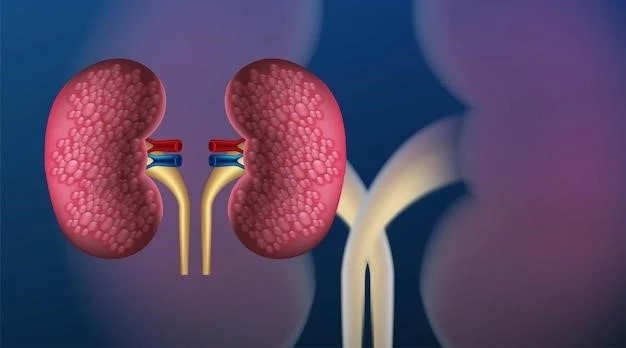Overview of Chromophobe Renal Carcinoma
Definition and Characteristics
Chromophobe Renal Carcinoma is a rare type of kidney cancer that typically develops in the cells of the renal cortex․ It is characterized by large, pale cells with distinct borders․ Unlike other renal cancers, it often has a better prognosis․
Incidence and Prevalence
Chromophobe Renal Carcinoma accounts for approximately 5% of all kidney cancers․ It is more commonly diagnosed in individuals between the ages of 40 and 60 years old․ The incidence rate is lower compared to other types of renal carcinomas․
Causes and Risk Factors of Chromophobe Renal Carcinoma
Potential Causes
The exact causes of Chromophobe Renal Carcinoma are not fully understood, but genetic mutations and alterations play a significant role in its development․ These genetic changes can lead to uncontrolled cell growth in the kidneys, contributing to cancer formation․
Risk Factors
Some risk factors for Chromophobe Renal Carcinoma include a family history of kidney cancer, inherited genetic conditions like Birt-Hogg-Dubé syndrome, and conditions like chronic kidney disease․ Smoking and obesity are also associated with an increased risk․
Symptoms and Diagnosis of Chromophobe Renal Carcinoma
Common Symptoms
Common symptoms of Chromophobe Renal Carcinoma include blood in the urine, abdominal or flank pain, a palpable mass in the abdomen, weight loss, and fatigue․ However, many cases are asymptomatic in the early stages․
Diagnostic Methods
Diagnosis of Chromophobe Renal Carcinoma involves imaging tests like CT scans and MRIs, a biopsy for confirmation, and blood and urine tests to assess kidney function․ These diagnostic methods help in determining the extent and characteristics of the cancer․
Treatment Options for Chromophobe Renal Carcinoma
Surgical Interventions
Surgical interventions for Chromophobe Renal Carcinoma may include nephrectomy – partial or complete removal of the affected kidney, or in some cases, a partial nephrectomy to preserve kidney function․ Surgery is often the primary treatment for localized tumors․
Medical Therapies
Medical therapies for Chromophobe Renal Carcinoma may include targeted therapy, immunotherapy, and chemotherapy․ These treatments are used in advanced or metastatic cases to help reduce the size of tumors, control cancer spread, and improve overall prognosis․
Prognosis and Survival Rates of Chromophobe Renal Carcinoma
Survival Rates
The 5-year survival rate for Chromophobe Renal Carcinoma is relatively high, with most patients having a favorable prognosis․ The survival rate can vary based on the stage at diagnosis and the effectiveness of treatment interventions․
Prognostic Factors
Prognosis for Chromophobe Renal Carcinoma can be influenced by factors such as tumor stage, tumor size, presence of metastasis, and overall health of the patient․ Response to treatment and genetic characteristics also play a role in determining the prognosis․
Genetic Factors in Chromophobe Renal Carcinoma
Genetic Mutations
Chromophobe Renal Carcinoma is associated with genetic mutations, including alterations in genes like FLCN and TP53․ These mutations can disrupt normal cell growth processes, leading to the development of cancer in the kidneys․
Familial Risk
Individuals with a family history of kidney cancer or genetic syndromes like Birt-Hogg-Dubé syndrome have an increased familial risk of developing Chromophobe Renal Carcinoma․ Regular screenings and genetic counseling may be recommended for those with a higher familial risk․

Lifestyle Changes for Managing Chromophobe Renal Carcinoma
Dietary Recommendations
For managing Chromophobe Renal Carcinoma, a diet rich in fruits, vegetables, whole grains, lean proteins, and low in processed foods and saturated fats is recommended․ Staying hydrated and maintaining a healthy weight can support overall well-being․
Exercise and Wellness
Regular exercise and physical activity can improve overall wellness in individuals with Chromophobe Renal Carcinoma․ It may help reduce stress, maintain muscle mass, enhance energy levels, and support a healthy immune system․ Consulting with healthcare providers for personalized exercise recommendations is advised․
Research and Innovations in Chromophobe Renal Carcinoma
Ongoing Studies
Current research on Chromophobe Renal Carcinoma focuses on identifying new targeted therapies, understanding the genetic basis of the disease, and improving diagnostic techniques․ Ongoing studies aim to enhance treatment outcomes and quality of life for affected individuals․
Emerging Therapies
Emerging therapies for Chromophobe Renal Carcinoma include targeted drugs that aim to block specific pathways involved in cancer growth, immunotherapies to enhance the body’s immune response, and precision medicine approaches tailored to individual genetic profiles․ These innovative treatments show promise in improving outcomes for patients․
